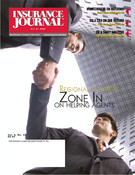Paula Burnes, CEO of the Texas Surplus Lines Association (TSLA), recently sat down with Insurance Journal senior writer Dave Thomas to discuss the Association’s role in the industry, its plans for the future, and more. Dallas-based Burnes was recently promoted to the position of executive vice president and COO of Swett & Crawford of Texas Inc., where she has worked for 16 years. As CEO of TSLA, she will be an active participant at the Association’s Mid-Year meeting, slated for July 20-23 in Williamsburg, Va.
Dave Thomas: What does your role with the TSLA entail?
Paula Burnes: I am the chief executive officer of the Association and lead the executive committee and the Board of Directors. I regularly consult with Jean Patterson, our executive director, on TSLA business. The TSLA is similar to NAPSLO in that you usually do a three-year board stint and then there’s a rotation. TSLA has 160 members and that number has held fairly steady. Even with merger activity we continue to recruit new members.
DT: What are the big issues this year?
PB: Our biggest issue this year as an association has been legislative. Our goal when we started the year was to maintain the status quo for surplus lines. With the huge focus on issuance issues in this state, and the fact that legislators on both sides of the aisle promised insurance reform, we had a train coming down the tracks. There were people writing legislation that had no in-depth knowledge of our business. The scary part of that are the unintended consequences.
Very few legislators are in the insurance business but we do have a couple in the House of Representatives that were very instrumental in helping us. Representatives Larry Taylor and Craig Eiland are in the business and have a great understanding of our safety valve function and were able to help us from an education standpoint with the other legislators.
Our counsel, Jim Shawn with Sneed, Vine and Perry did an outstanding job of meeting with Legislators, staff and testifying on our behalf. One of the things we committed to was to start to build a grassroots legislative effort in support of Jim. We were able to deliver PAC checks and make visits to Legislators and staff. Out of this has come the realization that we have to work hard to build personal relationships with legislators so that when we need to talk through our issues we can get through to them.
DT: Tell me a little bit about this year’s TSLA meeting in Virginia.
PB: We are going to have a wonderful turnout for the meeting. This is the first time we have traveled East in a long time and people are very excited about it. We have a great speaker’s program that will include industry updates, management topics, and our featured speaker, Congressman Pete Sessions speaking about Homeland Security.
DT: Where do you see the TSLA going over the next year?
PB: Our goals, aside from legislative are to keep our volunteers active and continue to network with the IIAT and the FIWT. We are working with the IIAT on some ideas regarding our young agents, and we have a joint task force to develop some guidelines to help retailers and wholesalers work more effectively together. We are also going to be networking with an insurance club at UT by inviting a few of their members to our Annual Meeting in Austin to see our side of the business.
DT: How would you describe the current overall insurance market in Texas?
PB: We’ve seen property rates level off and decline in some cases. Casualty is still hardening to some extent, but at a slower pace. As for mold, I think the jury is still out. It depends on whether exclusionary language that has been attached to almost every policy holds up or not.
As for the future from a legislative standpoint I think what happens with SB14 is critical. If SB14 performs as promised then I think there will be much less drive to regulate further. If it falls on its ear, which I don’t think it will, then I think we’ll have an even bigger problem next session.
The marketplace is fairly stable right now, but some areas are still very constricted such as med-mal, some D&O, residential contractors and developers and nursing homes.
DT: What message would you have for companies and agents in Texas right now?
PB: I would tell our companies and agents that they need to partner closely with their wholesalers to continue to build and maintain relationships.
DT: What have you enjoyed most in your affiliation with the TSLA?
PB: I have been so rewarded just by being around the members of the TSLA. There are so many top-notch people that belong to the association. I don’t hesitate to pick up the phone any time I need help.
Editors Note: Speakers lined up for the TSLA Mid-Year meeting include Wes Bissett, IIABA; Francis Bouchard, Zurich North America; Jack Fries, Fries & Fries Consulting; Andre Juneau, IIAT/Nieman, Hanks, Puryear; Ron Moore, AAMGA, The Southern General Agency; The Honorable Pete Sessions, U.S. Congressman; Paul Springman, Essex Insurance Co.; Sandra Waters, FIWT, St. Paul Insurance Co.; L.M. Wesson, NAPSLO, U.S. Risk LP; and Darin Yeomans, ImageRight.
To comment on this article, e-mail: dthomas@insurancejournal.com
Topics Texas Legislation Excess Surplus Leadership
Was this article valuable?
Here are more articles you may enjoy.


 How One Fla. Insurance Agent Allegedly Used Another’s License to Swipe Commissions
How One Fla. Insurance Agent Allegedly Used Another’s License to Swipe Commissions  A 10-Year Wait for Autonomous Vehicles to Impact Insurers, Says Fitch
A 10-Year Wait for Autonomous Vehicles to Impact Insurers, Says Fitch  Portugal Deadly Floods Force Evacuations, Collapse Main Highway
Portugal Deadly Floods Force Evacuations, Collapse Main Highway  BMW Recalls Hundreds of Thousands of Cars Over Fire Risk
BMW Recalls Hundreds of Thousands of Cars Over Fire Risk 


